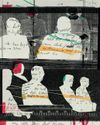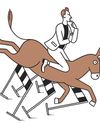
You’re walking fast, late for work. The line into the subway is barely moving. A man is walking very slowly, holding up everyone behind him. You’re annoyed. And then you catch a glimpse of him. He’s walking with the shuffle of the very old. You’re inclined to be a little more tolerant; after all, he can’t walk any faster. You look again—no, he’s not old, just drunk. It’s too late for him to sober up, but, it occurs to you, it was once up to him not to be drunk. And now you’re annoyed again.
But why stop there? There are bars everywhere, and billboards advertising the pleasures of spirits. The days are getting colder, and you live in a cold country—a cold country and a decadent one. Everyone drinks; how could he do otherwise? But, again, why stop there? Generous soul that you are, you wonder if he had a bad day, or week, or year, or life— one marked by the kind of suffering from which the bottle promises respite. Can you be sure that he doesn’t come from a long line of alcoholics, helpless in the grip of their compulsion?
You might go further. Perhaps all this was simply meant to be. Recall that old French polymath Pierre-Simon Laplace and his omniscient “demon.” If the demon knew where every particle in the universe was at a given moment, he could predict with perfect accuracy every moment in the future—which is another way of saying that the future is wholly “determined” by the past. The demon, of course, merely illustrates a thesis that can be stated in more sombre terms: everything that happens is the inevitable consequence of the laws of nature and what the universe was like once upon a time. We’re bound to do what we in fact do.
This story is from the {{IssueName}} edition of {{MagazineName}}.
Start your 7-day Magzter GOLD free trial to access thousands of curated premium stories, and 9,000+ magazines and newspapers.
Already a subscriber ? Sign In
This story is from the {{IssueName}} edition of {{MagazineName}}.
Start your 7-day Magzter GOLD free trial to access thousands of curated premium stories, and 9,000+ magazines and newspapers.
Already a subscriber? Sign In

GET IT TOGETHER
In the beginning was the mob, and the mob was bad. In Gibbon’s 1776 “Decline and Fall of the Roman Empire,” the Roman mob makes regular appearances, usually at the instigation of a demagogue, loudly demanding to be placated with free food and entertainment (“bread and circuses”), and, though they don’t get to rule, they sometimes get to choose who will.

GAINING CONTROL
The frenemies who fought to bring contraception to this country.

REBELS WITH A CAUSE
In the new FX/Hulu series “Say Nothing,” life as an armed revolutionary during the Troubles has—at least at first—an air of glamour.

AGAINST THE CURRENT
\"Give Me Carmelita Tropicana!,\" at Soho Rep, and \"Gatz,\" at the Public.

METAMORPHOSIS
The director Marielle Heller explores the feral side of child rearing.

THE BIG SPIN
A district attorney's office investigates how its prosecutors picked death-penalty juries.

THIS ELECTION JUST PROVES WHAT I ALREADY BELIEVED
I hate to say I told you so, but here we are. Kamala Harris’s loss will go down in history as a catastrophe that could have easily been avoided if more people had thought whatever I happen to think.

HOLD YOUR TONGUE
Can the world's most populous country protect its languages?

A LONG WAY HOME
Ordinarily, I hate staying at someone's house, but when Hugh and I visited his friend Mary in Maine we had no other choice.

YULE RULES
“Christmas Eve in Miller’s Point.”